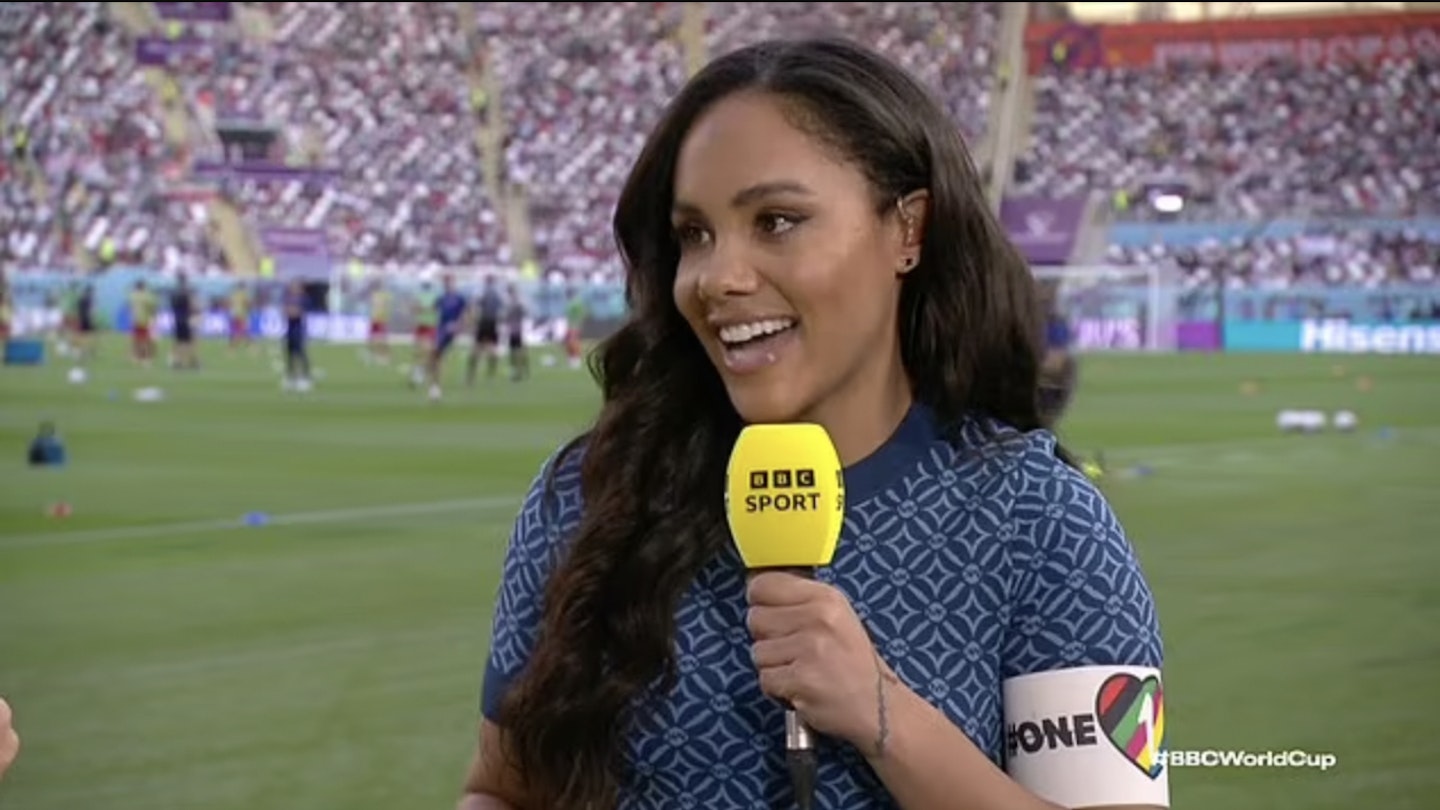Today, England joined six other countries announcing they would not wear the OneLove rainbow armband, which shows support for the LGBTQ+ community, during FIFA World Cup games. Announced just three hours before England’s opening match against Iran, the move comes after weeks of promises from the Football Association (FA) and captain Harry Kane that they would wear the armbands to take a stand against discrimination in Qatar.
However, Alex Scott - former England player turned sports presenter - has been spotted wearing the OneLove armband as she commentates from the side of the pitch, a decision heralded as incredibly brave by viewers. As a woman in Qatar, Scott is already much more vulnerable than her male counterparts, never mind showing support for queer people (Scott also identifies as queer, recently opening up about her past relationship with ex-Arsenal player Kelly Smith in her new memoir) in a country that deems homosexuality illegal.
Ahead of the tournament, Scott was criticised for even going to Qatar, many feeling she should boycott it. However, she later explained her reasoning to BBC Sport:
‘I totally understand [the] reasons as well as a whole heap of fans from around the world from the LGBT+ community not wanting to travel here,’ Scott said. ‘Once again, we referenced Gianni Infantino from what he said. You are not gay. You'll never understand travelling to a country where you are fearing for your life just because of your preference of who you choose to love. There's so much around this as well. To keep saying football is for everyone. That's what you keep feeding us with. We sit here and it’s not, because people have not been able to travel to watch their teams, to support their teams (out of fear) so you can’t say football is for everyone.
‘I've had conversations about “I should be staying at home, I should be boycotting” and I thought long and hard about it,’ she continued. ‘I think that for me personally would have been the easy option. I love my job and when I think about it sitting here and having the harder conversations and it's bigger isn't it? We're talking about migrant workers; we're talking about the LGBT+ community we're talking about women's rights. Let's hope in the next four years at the world cup we're never having to have those conversations again.’
England are said to have abandoned their promises to queer people after FIFA, the organisation which runs the World Cup, threatened to book any captain wearing the rainbow armbands with a yellow card.
‘FIFA has been very clear that it will impose sporting sanctions if our captains wear the armbands on the field of play,’ read a statement released from the Football Associations of England, Wales, Belgium, Denmark, Germany, The Netherlands, and Switzerland. ‘As national federations, we can't put our players in a position where they could face sporting sanctions including bookings, so we have asked the captains not to attempt to wear the armbands in FIFA World Cup games.
‘We were prepared to pay fines that would normally apply to breaches of kit regulations and had a strong commitment to wearing the armband,’ the statement continued. ‘However, we cannot put our players in the situation where they might be booked or even forced to leave the field of play. We are very frustrated by the FIFA decision which we believe is unprecedented - we wrote to FIFA in September informing them of our wish to wear the One Love armband to actively support inclusion in football and had no response. Our players and coaches are disappointed - they are strong supporters of inclusion and will show support in other ways.’
The risk for male footballers to fight for human rights is marginal compared to any queer fans simply attending the World Cup.
As a sports presenter, Scott is of course not held to the same regulations as England players – but that doesn’t mean she isn’t at risk. Qatar operates under Sharia Law, meaning women’s freedoms are heavily restricted. Scores of women have spoken out about how they wouldn’t feel safe travelling to Qatar to watch the tournament they love.
‘Not a single woman that I know is going to Qatar, but this is not massively surprising,’ Amy Drucquer, founder of online fan platform This Fan Girl told Metro. ‘Many are wondering if they would be safe going there, especially if they were on their own or with a bunch of girlfriends. How safe would that be?’
Amy also cited the treatment of queer people, migrant workers, and the human rights abuses that have reportedly taken place to build World Cup stadiums in Qatar as reasons many aren’t going to Qatar. A show of support against such discrimination from the England team then would’ve gone a long way then. Yes, the players could’ve faced sporting sanctions, but when is it ever safe to make a stand against discrimination, especially while in countries with the most extreme records on human rights abuses? The risk to male football players, invited to the country to take part in the most prestigious event in football, is marginal compared to the risks real people are taking by travelling there in the first place while queer or female.
Scott then, has demonstrated more bravery in the first few minutes of the England game than any of the players can this entire tournament. Viewers will remember their decision to abandon their queer and/or female fans, and we’ll be cheering for Scott’s courage more than any goal.
